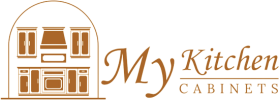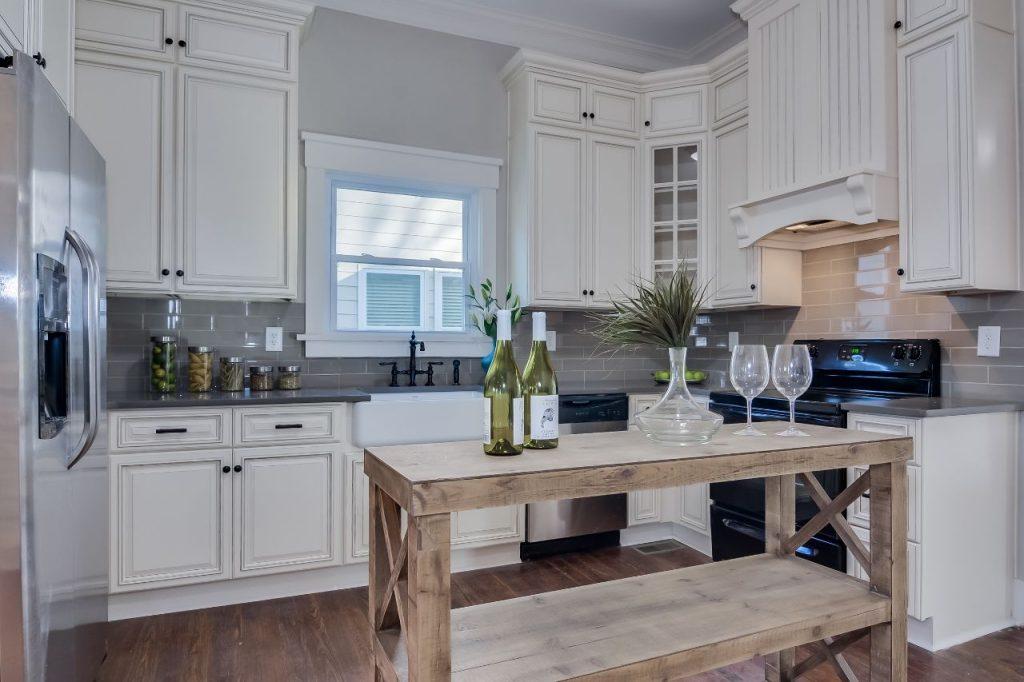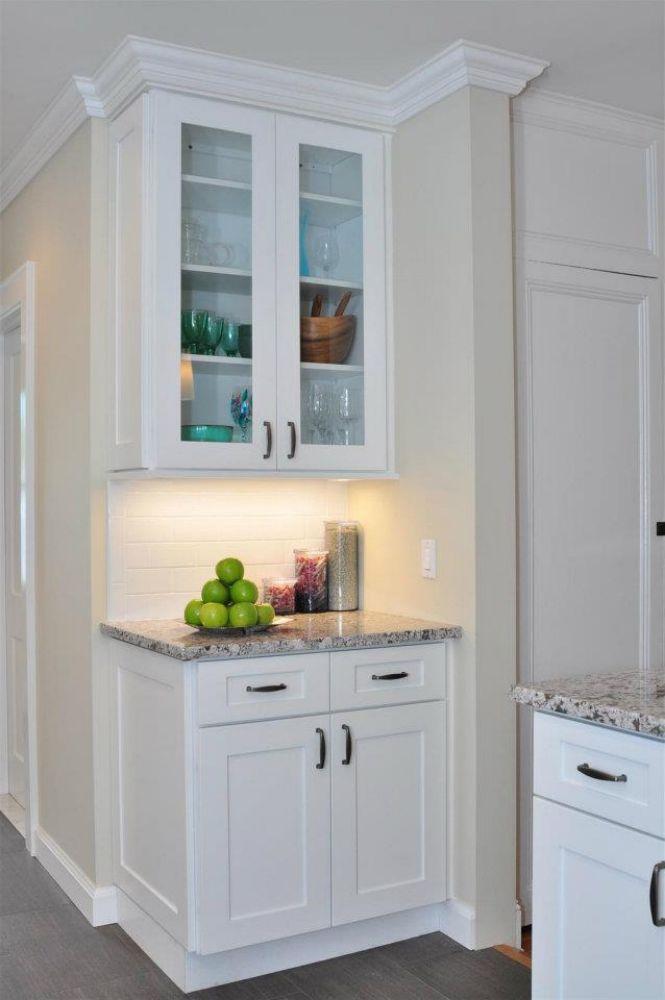Is It Worth It to Buy Custom Kitchen Cabinets?
Custom kitchen cabinets are a significant investment for any homeowner, and making the decision to purchase them requires careful consideration. To help you navigate this important choice, we’ve compiled answers to the ten most commonly asked questions about whether it’s worth it to buy custom kitchen cabinets.
1. What Are Custom Kitchen Cabinets?
Custom kitchen cabinets are meticulously crafted storage solutions that are tailored to fit your kitchen’s unique layout and design preferences. Unlike stock cabinets, which come in predefined sizes and styles, custom cabinets are built from scratch to match your exact specifications.
Why Choose Custom Cabinets?
- Maximized Space: Custom cabinets make the most of every inch in your kitchen, ensuring no space is wasted.
- Personalization: You have full control over the materials, finishes, and features, allowing you to create a kitchen that reflects your style.
- Quality: Custom cabinets are typically built with higher-quality materials and craftsmanship.
Cost Consideration
Custom cabinets often come at a higher price point compared to stock or semi-custom options. However, the benefits they offer can justify the cost for many homeowners.
2. Are Custom Kitchen Cabinets Worth the Investment?
The worthiness of custom kitchen cabinets depends on your specific needs and budget. Here are several factors to consider:
Budget Flexibility
- High-End Look: Custom cabinets can provide a luxurious and high-end appearance to your kitchen.
- Long-Term Value: They can add to the resale value of your home.
Lifestyle and Preferences
- Unique Layout: If you have an unusual kitchen layout, custom cabinets can maximize your space.
- Style and Aesthetics: Custom cabinets allow you to choose the exact look and finish you desire.
Return on Investment (ROI)
Custom cabinets may not provide a full return on investment if you plan to sell your home soon. However, if you intend to stay in your home for an extended period, the value they bring in terms of functionality and personal satisfaction can be significant.
3. How Do I Choose a Cabinet Design?
Selecting the right cabinet design is a crucial aspect of the custom kitchen cabinet journey. Here are steps to help you make the best choice:
Assess Your Needs
- Storage: Consider what items you need to store, such as pots, pans, dishes, or small appliances.
- Cooking Habits: Think about your cooking style and the equipment you use regularly.
Style and Aesthetics
- Personal Taste: Determine the style, color, and finish that align with your personal preferences.
- Kitchen Theme: Ensure that your cabinet design complements the overall theme of your kitchen.
Consult a Professional
- Kitchen Designer: Seek the expertise of a kitchen designer to help you create a functional and visually appealing design.
- Material Selection: Discuss material options for your cabinets, considering durability and maintenance.
Custom cabinets allow you to tailor the design to your specific needs and style, making your kitchen both beautiful and functional.
4. What Materials Are Used for Custom Cabinets?
Custom kitchen cabinets can be constructed using various materials, each with its own set of advantages and considerations. The choice of material greatly influences the overall look, durability, and cost of your cabinets.
Popular Cabinet Materials
- Hardwood: Provides a classic and durable option, with choices like oak, maple, cherry, and walnut.
- MDF (Medium-Density Fiberboard): Offers a cost-effective alternative with a smooth finish.
- Plywood: Known for its strength and resistance to warping, plywood is often used for custom cabinet boxes.
- Laminate: Ideal for a modern, sleek appearance and ease of maintenance.
Considerations
- Budget: Some materials are more budget-friendly than others.
- Aesthetics: The material you choose should align with your desired kitchen style.
- Durability: Consider how well the material will withstand daily wear and tear.
Consult with your cabinet designer to determine the best material that suits your budget and design preferences.
5. Can I Save Money with Custom Cabinets?
While custom kitchen cabinets are generally more expensive than stock cabinets, there are ways to manage costs:
Budget Planning
- Set a Budget: Establish a clear budget before starting the project to avoid overspending.
- Prioritize: Identify areas where custom cabinets are essential, and where you can use stock or semi-custom options.
Value vs. Cost
- Long-Term Value: Consider the long-term benefits of custom cabinets, such as increased home value and satisfaction.
- Quality: Invest in high-quality materials and craftsmanship to ensure longevity.
DIY vs. Professional Installation
- Installation: If you have the skills, you can save money by installing the cabinets yourself. However, professional installation ensures a precise fit.
Balancing your budget while prioritizing quality and functionality is key to making custom kitchen cabinets a cost-effective choice.
6. Are Custom Cabinets More Durable Than Stock Cabinets?
Custom cabinets are often associated with higher durability due to the quality of materials and craftsmanship involved. Here’s why they are known for their durability:
Quality Materials
- Solid Wood: Custom cabinets frequently use hardwoods, which are robust and less prone to damage.
- Plywood: Plywood construction is sturdy and less likely to warp or split compared to particleboard used in some stock cabinets.
- Attention to Detail: Custom cabinets are handcrafted, ensuring precision and durability.
Longevity
- Investment: Custom cabinets are an investment in your home, providing long-term value.
- Resale Value: They can add to the resale value of your home due to their durability and timeless appeal.
While stock cabinets can also be durable, custom cabinets are often built to withstand the test of time and daily use.
7. How Long Does It Take to Get Custom Cabinets?
The timeline for getting custom kitchen cabinets can vary depending on several factors:
Design and Planning
- Initial Consultation: The process begins with a consultation to discuss your needs, preferences, and design ideas.
- Design Phase: Designing the cabinets to your specifications can take several weeks, including revisions.
Manufacturing
- Construction: Once the design is finalized, the manufacturing process begins, which can take several weeks.
- Finishing: Custom finishes and paint jobs may add extra time to the manufacturing process.
Installation
- Preparation: Preparing your kitchen for installation, including removal of old cabinets, can take a few days.
- Installation: The installation process typically takes a few days to a week, depending on the complexity.
In total, you can expect the process of getting custom cabinets to span several months, so it’s essential to plan accordingly.
8. Can I Make Changes During the Cabinet-Building Process?
Flexibility is one of the key advantages of custom cabinets. You can make changes during the cabinet-building process, although it may impact the timeline and cost.
Communication
- Open Dialogue: Maintain clear communication with your cabinet designer to discuss any modifications.
- Design Revisions: Understand that design changes might necessitate revisions to the plans and potentially extend the manufacturing timeline.
Timing
- Early Changes: It’s generally easier and less costly to make changes in the design phase than during construction or installation.
While custom cabinets offer flexibility, it’s essential to communicate your preferences and any changes promptly to ensure your satisfaction with the final product.
9. How Do I Find a Reliable Cabinet Manufacturer?
Finding a reliable cabinet manufacturer is crucial for a successful custom kitchen cabinet project. Here are steps to help you locate the right one:
Research and Recommendations
- Online Research: Start by searching for cabinet manufacturers online and reading reviews.
- Ask for Recommendations: Seek recommendations from friends, family, or neighbors who have had custom cabinets installed.
Interviews and Quotes
- Interview Multiple Manufacturers: Contact several manufacturers to discuss your project and gather quotes.
- Ask Questions: Inquire about their experience, portfolio, and the materials they use.
- Visit Showrooms: If possible, visit showrooms to see their work in person.
References
- Check References: Ask for references from previous clients to gauge their satisfaction and the quality of work.
Choosing a reputable and experienced cabinet manufacturer is crucial to ensure your custom cabinets meet your expectations.
10. How Do I Maintain Custom Kitchen Cabinets?
Maintaining your custom kitchen cabinets is essential to preserve their beauty and functionality over time. Here are some tips for cabinet care:
Regular Cleaning
- Dust: Wipe down your cabinets regularly to prevent dust buildup.
- Spills: Clean up spills promptly to prevent staining or damage to the finish.
- Cabinet Hardware: Clean and tighten cabinet hardware as needed.
Avoid Harsh Chemicals
- Cleaning Products: Use mild, non-abrasive cleaners to avoid damaging the cabinet finish.
- Avoid Moisture: Prevent excessive moisture exposure to prevent warping or damage.
Preventative Measures
- Soft-Close Hinges: If your cabinets have soft-close hinges, use them to avoid slamming doors.
- Cabinet Liners: Consider using cabinet liners to protect the interior from spills and stains.
By following these maintenance tips and caring for your custom cabinets, you can ensure they remain in excellent condition for years to come.
In conclusion, the decision to buy custom kitchen cabinets involves various considerations, from budget and design to materials and maintenance. By addressing these common questions, you can make an informed choice that suits your unique needs and preferences, ultimately enhancing the functionality and aesthetics of your kitchen.
Conclusion
In conclusion, the decision to invest in custom kitchen cabinets is a significant one that requires careful thought and consideration. This comprehensive guide has addressed the ten most commonly asked questions about the worthiness of buying custom kitchen cabinets, providing you with valuable insights into this important home improvement decision.
Custom kitchen cabinets offer a range of benefits, including personalized design, maximized space utilization, and high-quality craftsmanship. While they may come at a higher cost than stock cabinets, the long-term value they bring to your home, both in terms of functionality and aesthetics, can make them a worthwhile investment for homeowners who prioritize a unique and tailored kitchen space.
Selecting the right cabinet design and material, setting a realistic budget, and finding a reliable cabinet manufacturer are key steps in ensuring a successful custom cabinet project. Additionally, understanding the maintenance requirements for custom cabinets is crucial for preserving their beauty and functionality over time.
Ultimately, the decision to buy custom kitchen cabinets should align with your specific needs, lifestyle, and preferences. By weighing the pros and cons and considering the factors outlined in this guide, you can make an informed choice that transforms your kitchen into a functional and visually appealing space, tailored to your taste and requirements.



